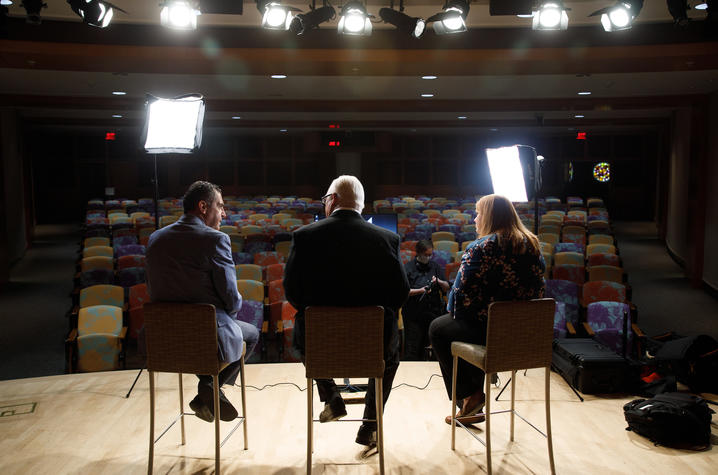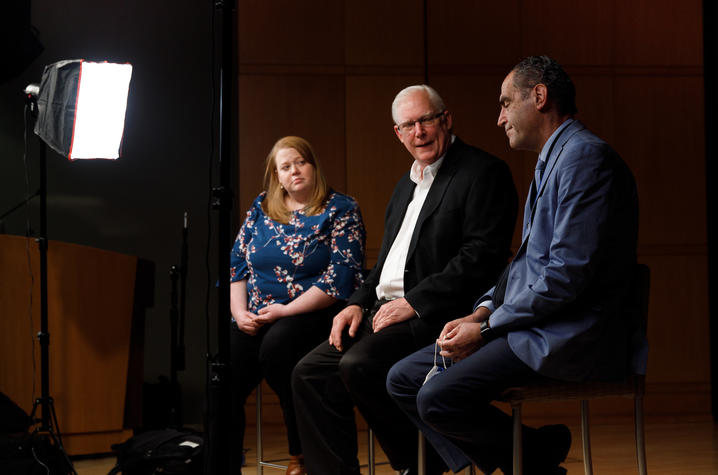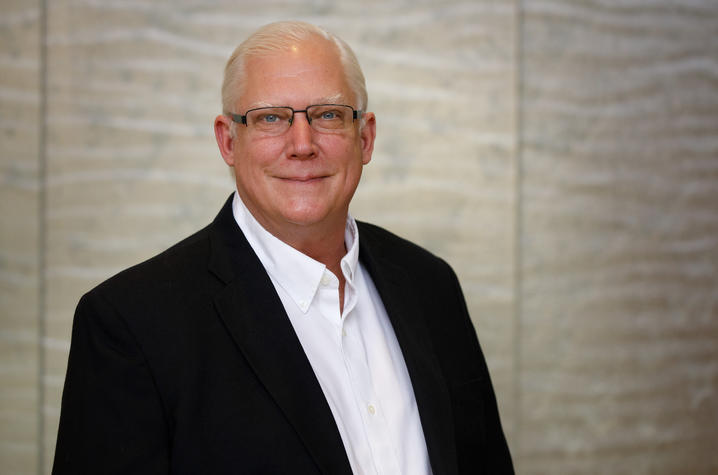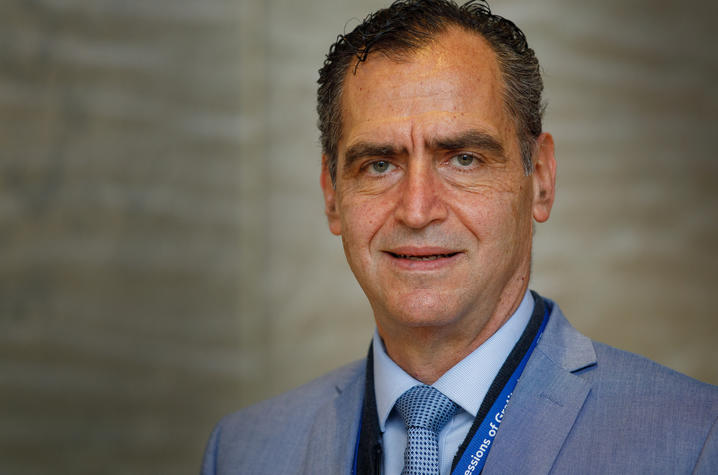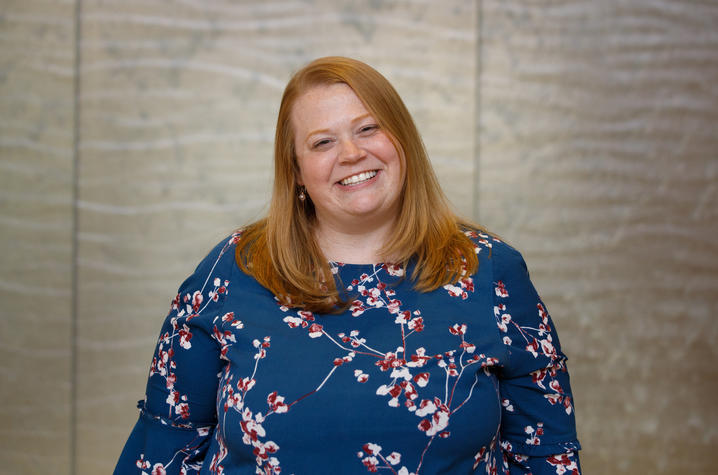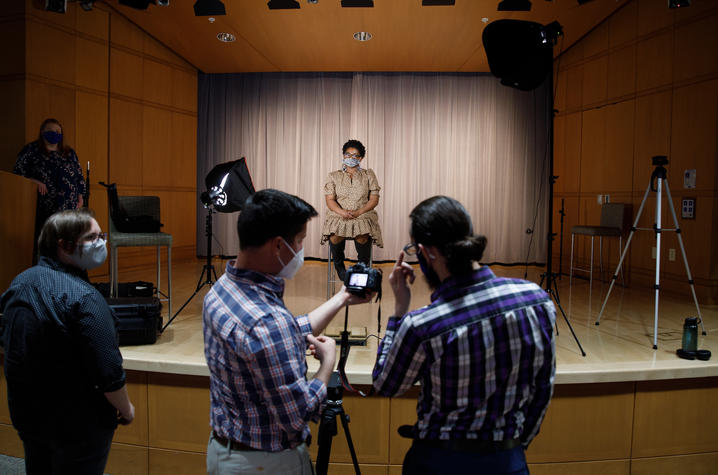UK Doctor's Need to Help Loved One Inspires New Sanders-Brown Video Series
LEXINGTON, Ky. (April 27, 2021) — Dr. Peter Sawaya is the associate chief of Nephrology at the University of Kentucky, but it isn’t through his work there that he saw a great need in a certain area of health care. It instead is through his work on a much more personal level – as the primary caregiver for a family member living with dementia.
“I thought about it because I’m dealing with it. It is so hard,” he said.
As he has navigated this chapter of his life over the past 13 years, he says he has often thought, “Wouldn’t it be great if there was a school for people to go to?” To him, that school would provide a place for people not yet experiencing advanced dementia but that are in the early to middle stages, as well as a place for caregivers to learn.
“We have a lot of help when they get advanced. They can go live in certain places or go to a daycare type of program … but you really can’t pair someone with early disease with someone advanced. It is too depressing for them,” he explained.
With the basis of this idea but no way to really execute it, Sawaya reached out to Dr. Greg Jicha with UK’s Sanders-Brown Center on Aging (SBCoA). Jicha and SBCoA have a long history of providing programming for the community through various means.
Jicha agrees with Sawaya that there is a lack of programming available to actively engage those with early to mild dementia, “How do we help maintain mental health and cognitive abilities in folks other than just giving them a pill and hoping that will work?”
Jicha, who is the clinical core director for SBCoA, says it is not just a small aspect that is missing but is in fact a key piece of brain and memory health. He says they know that in the early development of memory problems one of the major brain changes involves the limbic areas in the emotional areas of the brain. “That leads to what we call apathy. Someone constantly saying, ‘I don’t want to’. That accelerates the degenerative process, and it accelerates the cognitive and functional decline by not engaging.”
With Jicha’s knowledge and Sawaya’s personal experiences, they are now in the process of developing two different programs. The first is being called the Brain Academy, which is focused on providing physical and emotional engagement for those with mild memory problems. Simultaneously, they are creating the second program, Thumbs Up for Brain Health, which will provide activities but is also designed to train caregivers. “What are you to do in eight hours with somebody that used to do everything themselves and now they cannot do those things? Sit and stare at each other? It is a real struggle,” said Sawaya.
The program will be for both family members who serve as caregivers as well as for someone a family might hire to help take care of their loved one. For example, Sawaya says if he has someone come help with his family member for a little while he can give them one of the videos to watch and participate in while they are helping out. He envisions one day also making the video classes available in group settings possibly at churches or community centers.
Jicha says each episode will give caregivers tools for ways they can interact with a person even if they don’t want to do something in particular. “They might not want to do physical activity segments because they just aren’t into that, but hopefully they will love the segments on diet and brain-healthy foods, or on art, music, dancing, brainteasers, learning a language, studying astronomy. Everything that we can dream of and or imagine is being brought into this program to engage others.”
Right now, the plan is for each program to have 24 different episodes that each have a unique and engaging theme. Participants could find themselves taking a trip to France, where Jicha says they will go through various exercises simulating a travel day, watch video tours of sites in the area, learn to speak a little French, learn about the French culture, and then how to cook a French dish that is brain healthy.
“Our primary goal is to help one on one, the person at home who is saying, ‘What am I going to do with my loved one today, or the person at home with a memory problem saying, I don’t really want to do anything today.’ If we can get them dancing, singing, or learning something. At the end of the day, we will have done our deed, one person at a time.”
Putting a project like this together is something that Jicha says would not be doable without an institution like the University of Kentucky where there are experts on a very wide range of topics and activities who can contribute to the programming. Another key contributor to the project is Allison Gibson, Ph.D., assistant professor in UK’s College of Social Work, who is helping generate content while also making sure it is all appropriate. She brings the expertise not only as a social worker but as a former Alzheimer’s Association social worker who also is a caregiver for a family member living with Alzheimer’s disease.
“When we first started this endeavor, I was a little nervous that we were going to be able to find enough content for the show. We started reaching out and cold calling different entities across campus – I have been overwhelmed with the support this project is receiving from UK. From the Food Connection willing to help us with cooking segments to the UK Opera Theatre letting us film in their practice space … this is truly a UK effort,” Gibson said.
The team hopes to have a series of episodes available to stream online and on DVDs by early June. Jicha says they are working on an aggressive timeline, partially because of the continuing burden of the COVID-19 pandemic.
Sawaya has seen the impact of the past year first-hand and says he is confident that his loved one’s mind deteriorated further, “We sacrificed their mind to keep them safe.” The need for accessible programs became exacerbated as day programs shut down throughout the state.
Jicha says this exact problem was seen before COVID-19 in underserved areas of the state with day programs really only available in some of the larger cities in Kentucky. That is also a reason why they are making sure the programs will be available via DVDs – free of charge - for those who do not have optimal internet access to stream each episode. “This is all about providing a resource that many don’t have access to. We want people to know they will have a program to help maintain their brain health. They will have a program that gives them ideas and activities to do with loved ones that are brain-building. COVID-19 has really shown that technology is a valuable tool with little limitations.”
Jicha says when it comes to this type of programming simply put, “We need more”. He says thanks to technology this project has the potential to not just make a dementia-friendly Lexington, but a dementia-friendly state, region, United States, and ultimately a dementia-friendly world. “We hope that the quality of programming that we are putting together is sufficient for us to garner increased interest in the future. We hang on to the possibility that we could in the future have PBS or a network potentially pick up on this type of outreach,” said Jicha.
The launch of this project is possible because of a generous financial gift. Sawaya hopes others will be inspired to help, not just financially but by offering their talents and knowledge. “I hope to hear people say, ‘How can I help?’ It is such a need for the society,” he said.
He also hopes this program will provide some reprieve for others like himself who in the snap of a finger, in his family member’s eyes, can go from a loved one to a caregiver, “It is hard. It is just really hard.”
As the state’s flagship, land-grant institution, the University of Kentucky exists to advance the Commonwealth. We do that by preparing the next generation of leaders — placing students at the heart of everything we do — and transforming the lives of Kentuckians through education, research and creative work, service and health care. We pride ourselves on being a catalyst for breakthroughs and a force for healing, a place where ingenuity unfolds. It's all made possible by our people — visionaries, disruptors and pioneers — who make up 200 academic programs, a $476.5 million research and development enterprise and a world-class medical center, all on one campus.





